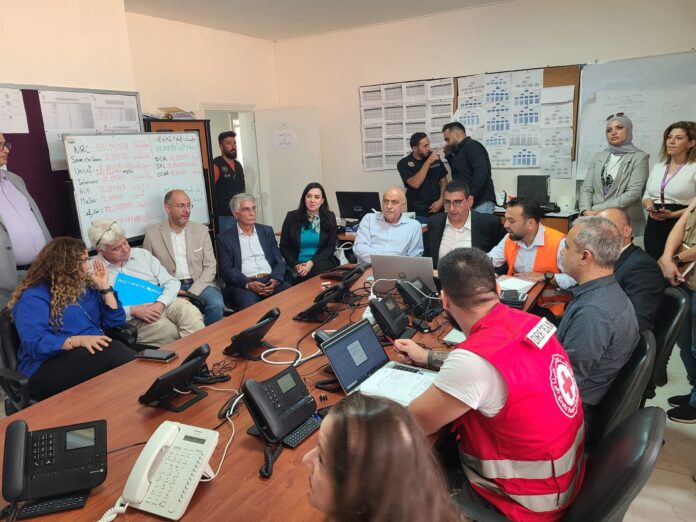Lebanon is a bulwark for the region, and we must prepare an appropriate response to the crisis before it is too late.
The Minister of Social Affairs, Dr. Hector Hajjar, met with a delegation led by the Lebanese NGOs Network and the Follow-up Committee for Lebanese and Palestinian Civil Society Organizations. On this occasion, Dr. Kamel Mohanna, General Coordinator of the Network, expressed solidarity with the populations of the Palestinian Territories, especially in Gaza, in the face of the ongoing crime against humanity in the region.
As part of the close cooperation with the ministry, Dr. Mohanna also presented the proposals of the Network regarding the emergency plan developed by the government, in collaboration with the United Nations, relevant ministries, the Coordination Committee for the Management of Disasters and National Crises, and the Risk Management Unit within the Prime Minister’s Cabinet. This is in an effort to develop a comprehensive humanitarian response, as Lebanon, facing a multidimensional crisis, confronts an escalation of conflicts on the southern border, potentially evolving into a large-scale war.
Discussions focused on the security of shelters for displaced persons, access to humanitarian aid, and food security, based on scenarios similar to the Israeli aggression of 2006. At that time, the aggression had forced the displacement of one million Lebanese for 45 days, unprecedented pressure on the health sector, and the establishment of collective reception centers accommodating 20% of the displaced, approximately 200,000 people, along with means to provide expected humanitarian aid. The government emphasized that, if necessary, local and international humanitarian organizations would be called upon again; this, as highlighted by the Network, requires a coordinated response in close collaboration with the relevant ministries.
 Additionally, the Network noted the proposal to separate aid provided to the Lebanese population, overseen by relevant ministries and authorities, from that provided to the rest of the population, which would be divided into three categories (Syrian refugees, Palestinian refugees, and migrant workers) and handled by local and international organizations. Such a distribution would only be effective with coordinated efforts and, crucially, the guarantee of necessary funding for the humanitarian organizations’ actions.
Additionally, the Network noted the proposal to separate aid provided to the Lebanese population, overseen by relevant ministries and authorities, from that provided to the rest of the population, which would be divided into three categories (Syrian refugees, Palestinian refugees, and migrant workers) and handled by local and international organizations. Such a distribution would only be effective with coordinated efforts and, crucially, the guarantee of necessary funding for the humanitarian organizations’ actions.
The Network also raised the issue of fuel supply, crucial for implementing the emergency plan on the ground, as well as the need to train a greater number of individuals capable of participating in the on-the-ground response, which the organizations under the Network have already anticipated.
In conclusion, the members of the NGOs Network reiterated their central role in preserving the cohesion of Lebanese society and strengthening it during the civil war and repeated Israeli wars against Lebanon. No effort will be spared to support the rights and dignity of the population, regardless of the cost. They also praised the cooperation with the Ministry of Social Affairs and its leading role in coordinating efforts between humanitarian actors and other state institutions.


 Creative Commons Attribution 4.0 International license
Creative Commons Attribution 4.0 International license